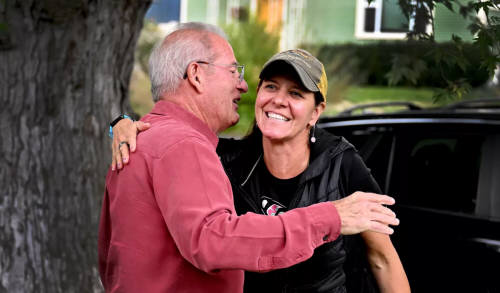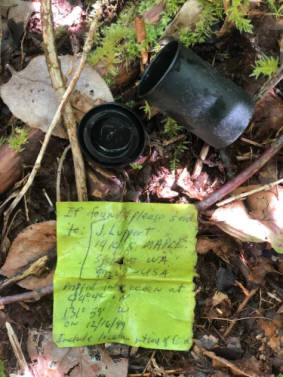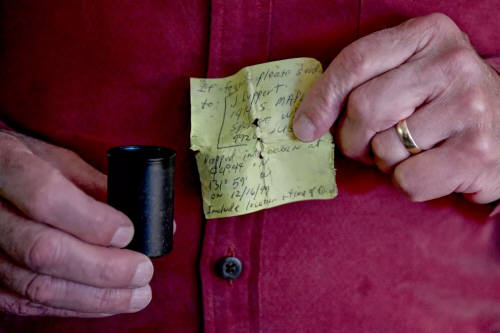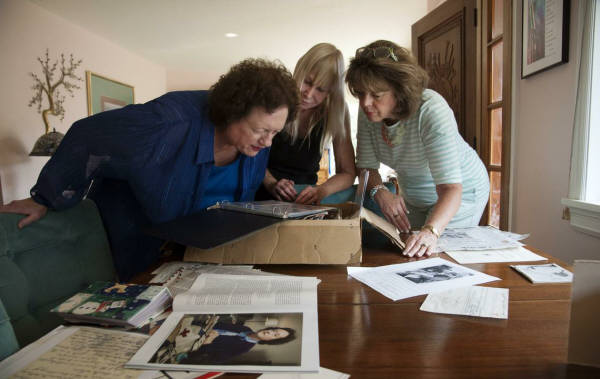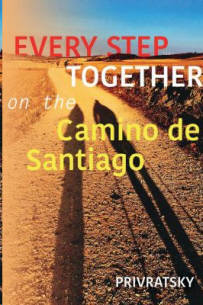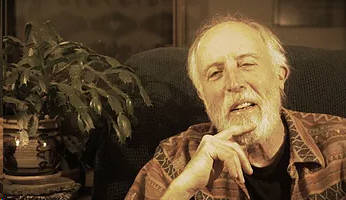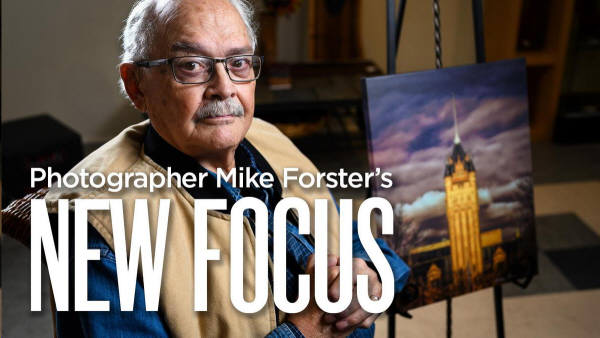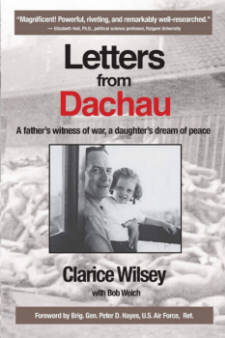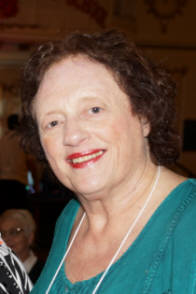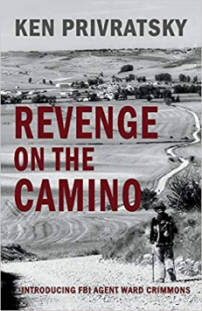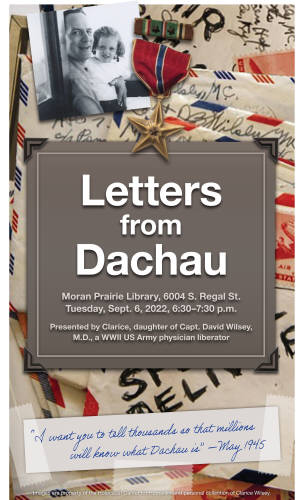Mark Pearson
Become Part of The Journey...
One Of Those Times In A Life
(
Click above for the songs
and stories of a lifetime.)
Creative accomplishments of our classmates
Class of LC 1965 graduate,
Ken Privratsky
This book is the first one capturing logistics achievements enabling the British victory, and it remains the only book on that war to date by an American.
(Click above for more details)
This is the story of one of the nation's most vicious and prolific serial killers, Robert Lee Yates, Jr.
(Click above for more details)
(Click above for the full articles from the Spokesman)
Spokane doctor’s letters from Dachau being preserved for history
has been presented the following prestigious awards:
Esther Matthews Award ….Highest Award from the Oregon Career Development Association for leadership, scholarship and contributions to the career development field
Anne Leavitt Award… highest award in the Division of Student Life for making significant contributions in the lives of students at U of O
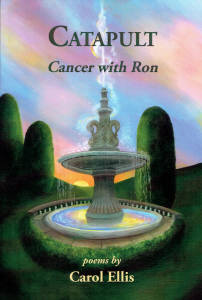
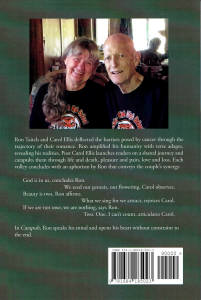
Catapult: Cancer with Ron
Copyright 2016 by Carol Ellis
All rights reserved
ISBN 978-1-68418-502-3
Cover art by Helen Hansen
Photo by Chris Crick
All proceeds go to the Benaroya Research Institute at Virginia Mason, for Cancer Research
Donate online and enter Ron Taitch in the comment section at
www.benaroyaresearch.org
Mailing address: Virginia Mason Foundation
P.O. Box 1930, Seattle, WA 98111-1930
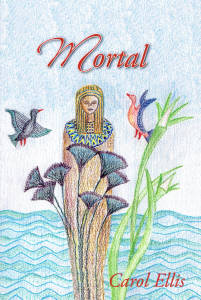
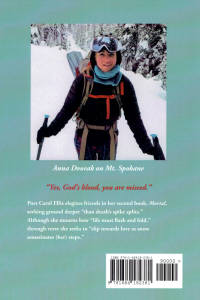
Fri., Nov. 29, 2019By Treva Lind treval@spokesman.com
(509) 459-5439
Images of Spokane’s past beckon Mike Forster, an artist who found his way back to creativity through a lens.
And this one to a few representative broadsides: https://yake325.wixsite.com/bill-yake-poetry/poems-broadsides
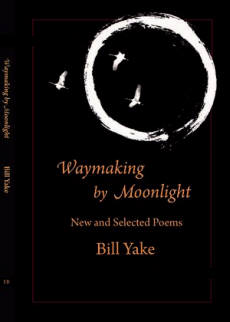
B
I
L
L
Y
A
K
E
New and Selected Poems, from Empty Bowl Press (Anacortes).
https://www.emptybowl.org/store
Should you be interested in a copy, options include:
1) Getting a signed copy directly from me: yake@comcast.net ,
2) Ordering from Empty Bowl( https://www.emptybowl.org/store/waymaking-by-moonlight-by-bill-yake ), or
3) Ordering from your favorite independent bookstores or Amazon is also an option.
(FBI Agent Ward Crimmons)
Revenge on the Camino is the first book in a trilogy introducing Agent Crimmons and spanning the Camino de Santiago.
Clarice Wilsey will be giving a presentation from her book, "Letters from Dachau" at the
Moran Prairie Library, 6004 S. Regal St.
Tuesday, Sept. 6, 2022, 6:30–7:30 p.m.
Let's all show up to support our LC 1965 classmate!

The late Bill Morlin’s impact as an investigative reporter covering extremism, corruption and crime for The Spokane Daily Chronicle and The Spokesman-Review still reverberates throughout the region.
“He is the journalist of the journalists in the Pacific Northwest, a guy who dedicated his entire life to covering his hometown with thoughtfulness, integrity and ethics,” said Ben Shors, Department Chair of Journalism and Media Production at Washington State University’s Edward R. Murrow College of Communication.
Morlin, who died in 2021 of complications of an intestinal infection, spent decades covering extremism in the Inland Northwest. In his nearly half-century career at Spokane newspapers, his award-winning coverage of the Aryan Nations compound in North Idaho and domestic terrorist groups led Morlin to be considered the pre-eminent reporter on extremism.
In a crowded ballroom at WSU’s Compton Union Building Wednesday afternoon, the Murrow College recognized Morlin for his decades of hard-hitting coverage during the 47th annual Murrow Symposium. His wife, Connie Morlin, accepted the honor on his behalf after former collaborator Karen Dorn Steele gave a heartfelt account of Morlin’s career.
Morlin’s recognition by the Murrow College was spurred by Shors, another former colleague of Morlin.Shors spent seven years at The Spokesman-Review investigating social and environmental issues in the early 2000s.
“Bill was a tireless investigative reporter who never cowered in the face of terror,” Shors said.“When a neo-Nazi pulled a gun on Bill Morlin, he kept reporting.When the Aryan Nations put him on his hit list, he kept reporting.When an extremist group bombed The Spokesman-Review, he kept reporting.”
Dorn Steele, a 1995 Washington state Hall of Journalistic Achievement inductee, worked closely with Morlin during her decades at Spokane newspapers.Dorn Steele is known for her investigative reporting on public health issues stemming from nuclear testing at the Hanford Nuclear Site, the involvement of Spokane-based psychologists in the CIA’s “rendition” torture programs following 9/11 and Spokane Mayor Jim West’s use of city computers to search dating sites – an investigation headed by Dorn Steele and Morlin.
“When I joined the Chronicle staff in 1983, after an early career in public television, I already knew that Bill was special,” Dorn Steele said.
A third-generation Spokanite, Morlin’s reporting strengths were his steadfast commitment to his community and a seemingly endless network of sources, she said.
Dorn Steele shared recollections from former reporter and longtime Spokesman-Review contributor Jess Walter, now a bestselling author. Morlin provided research and reporting for Walter’s first book, “Every Knee Shall Bow,” which delves into the fatal federal standoff in North Idaho known as Ruby Ridge – named for a geographic marker Morlin identified covering the incident.
Dorn Steele recalled how Morlin was fearless. She shared aquote from a conversation she had with Walter while preparing for her speech that highlighted Morlin’s candid nature when covering extremist hate groups like the Aryan Nations.
“Bill would get in their faces and ask just a barrage of questions,” Walter told Dorn Steele. “My tendency as a reporter was to sneak around, get some information and then approach them with some trepidation. Bill told me to just go up and ask them. He greeted them by name.”
Morlin’s impact stretched far beyond the stories he covered, Dorn Steele said. He frequently was consulted on national stories that involved extremism and domestic terrorism, and he was a staunch supporter of young reporters following in his footsteps.
Freelance extremist reporter and author Leah Sottile was one of many young journalists Morlin mentored. In an email, she echoed Dorn Steele’s remarks about his dogged nature and commitment to exposing hatred, corruption and extremist movements.
“My relationship with Bill was by and large over the phone,” Sottile said. “I’m a freelancer with no colleagues and no newsroom, and Bill was willing to be my colleague.I always found that to be so kind: that he was willing to spare time from his retirement to talk about extremism with me.
“But I think extremism is one of those beats that once you do it, you find a need for kinship with other people who are willing to take on this crazy work.”
In the decades since Morlin started reporting on extremism, other outlets and reporters have started taking fringe movements more seriously, Sottile said. Sottile and Dorn Steele acknowledged the criticisms often levied at Morlin’s reporting: Those groups should not be given attention.
“But he remained steadfast that turning a blind eye to hate movements would not make them go away,” Sottile said. “During myconversations with Bill, he was clear that the things that he used to hear from the pulpit at the Aryan Nations were being expressed by the president of the United States, Donald Trump.”
Shors echoed Sottile’s comments, emphasizing that in the ’80s and ’90s, extremist movements flew under the radar.
“I think he would welcome more people focusing on this; the fight goes on,” Shors said. “It didn’t end in 1995, it didn’t end when he retired, it goes on and it will go on for generations.”
Sottile said it is important for younger journalists to understand the work of those who came before them, like Morlin.
“Bill is an example of someone who believed in his reporting and fought hard for it,” Sottile said.n“And because of that willingness to fight for his work, the world is better for it.”
Bill Morlin died of sepsis in the same Spokane-area hospital where he was born.
Connie Morlin said her husband was mentoring and reporting from his hospital bed, providing Sottile notes on an advanced copy of her book on extremism, “When the Moon Turns to Blood: Lori Vallow, Chad Daybell, and a Story of Murder, Wild Faith, and End Times,” which she dedicated to him.
Connie Morlin said he told her to make sure to “tell Leah I’m still working on it.”
In the days preceding his death, Connie Morlin said two things put a smile on his face. The first was hearing a handwritten letter he received from Dorn Steele that recounted how much he had meant to her.
The second was a call from Shors in which he told him he would honor his legacy.
“My husband had these piercing blue eyes,” Connie Morlin said. “His blue eyes were twinkling; he was just so pleased and just so grateful.”
By Cindy Hval
For The Spokesman-Review
Sunday, October 8, 2023
In December 1999, John Luppert of Spokane flew to Hawaii to join his brother’s Coast Guard ship for the final leg of its return to Seattle.
"The Coast Guard has a program which allows crewman to invite guests for short cruises,” Luppert said.
He’d taken his 35mm camera with him and snapped lots of photos. One day, on a whim, he wrote his name, address, and location coordinates on a sticky note, tucked it into a plastic film container, and tossed it overboard.
“We were halfway between Hawaii and Seattle,” he said. “I’d put messages in bottles a few times before and never heard anything. I thought this was just another one of my lost causes.”
Months passed – then years. Luppert wondered if the film canister had been swallowed by a big fish or smashed on some rocks.
After a while, he stopped wondering.
On July 2, 2018, Trina Nation was beachcombing on the Dall Islands in Alaska. Nation and her husband own Treasure Hunters Lodge in Klawock on Prince of Wales Island. They offer guided hunting trips and charted fishing expeditions.
Nation is a beachcombing enthusiast.
“It’s what I love to do most,” she said.
On this July day, she was scrabbling around the beach at Kaigani Harbor. It was the first time she’d explored that spot.
“I’m always looking for the beachcomber’s ‘holy grail’ – a Japanese glass fishing float,” said Nation. “Right now, I’m finding a lot of Croc shoes.”
The rocky coastline of the pine-shrouded harbor was littered with branches and tree debris. Salal, or Oregon wintergreen, shrubs crowd the area.
“I don’t normally climb into the salal,” she said. “It’s dense and scratchy.”
But something caught her eye, and she maneuvered her way into the undergrowth.
“Suddenly, I was nose-to-nose with a film canister!”
Intrigued, she carefully opened it and gently pulled a sticky note. One edge was frayed, but the handwriting was still legible.
After 18½ years, Luppert’s message had been found.
Nation took a photo of the container and the note exactly where she found it. When she returned home, she immediately sent a letter to the address Luppert had provided.
“I look in all the bottles I find,” she said. “I was enchanted by the possibility that this might lead to a connection.”
Luppert was astonished to receive her letter.
“I couldn’t believe it!” he said. “I was thrilled it survived and that I could see the spot where it was found.”
He quickly replied to the email address Nation provided and they struck up a friendly correspondence.
“From the first letter, I thought, ‘I’ve got to meet this guy,’ ” Nation said.
Her in-laws live in Montana, so she’d driven through Spokane but never stopped. She also has a friend who’d moved here, so she decided a Spokane visit was in order. The pandemic, however, postponed her original trip.
Finally, on Sept. 28, she pulled up in front of Luppert’s South Hill home.
Nation has found several messages in bottles while beachcombing and reached out to those who left addresses, but this was the first time she’d met one of the messengers in person.
Nation, 49, and Luppert, 76, greeted each other like old friends. She reached into her bag and pulled out the film container with the note still tucked inside.
Luppert held it and marveled.
“If it could talk, what kind of story would it tell about where it’s been?”
Nation charted the coordinates on the note to the location where she’d found it.
“It had traveled 602 nautical miles – nearly 700 miles,” she said.
Luppert is delighted with the results of his long-ago “lost cause.”
“I got to meet a fascinating person,” he said.
He’d written on the note, “If found, please send to …” but Nation said the first rule of beachcombing is “finders keepers.”
She kept the note but brought Luppert a Japanese glass fishing float she’d purchased at a gift shop. Her holy grail still eludes her, but she said she’s found something even better.
She smiled at Luppert.
“At the end of the day, all you have are your memories and the connections you’ve made.”
Contact Cindy Hval at dchval@juno.com.
